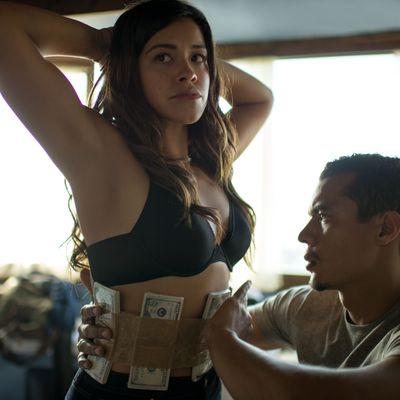
The director Catherine Hardwicke (Thirteen, Twilight) and the actress Gina Rodriguez (Jane the Virgin) have done their damnedest to make something honest out of the U.S. version of Gerardo Naranjos 2011 Mexican hit, Miss Bala, and the movie is not quite the clunker some reviewers have made it out to be. Close, but  The souped-up plot is certainly indigestible (cheesecake, beefcake, bullets  choke on that), and theres a steady stream of bad laughs, but something genuinely frightening comes through: a womans sense of disempowerment by men on all sides of the law. Hardwicke sticks to her guns  meaning theres no play in the gunplay, only horror.
RodriguezÔÇÖs Gloria has no connection to guns or crime. SheÔÇÖs an L.A.-based makeup artist (a U.S. citizen) who returns to her hometown, Tijuana, to help her childhood friend, Suzu (Cristina Rodlo), compete in the Miss Baja beauty pageant with a prize of a $10,000 scholarship. (Sample dialogue, Gina to Suzu: ÔÇ£I always felt like I was a stranger here. You made me feel like family.ÔÇØ) The trouble starts when Suzu wants (with a mix of ambition and na├»vet├®) to mingle with some pageant power brokers at a nightclub and thereÔÇÖs an attempted hit on a radiantly sleazy government official. After crawling under the cross fire, Gloria searches desperately for Suzu and, after going to the police with info, finds herself surrounded by stereotypical, tattoo-laden bad hombres ÔÇö among them hunky, blue-eyed, often shirtless kingpin Leno (Ismael Cruz Cordova), who promises to find GloriaÔÇÖs missing friend in return for some special services.
Do those services include sexual ones? The threat of sexual assault hangs over Miss Bala, but Hardwicke walks a thin ÔÇö precariously thin ÔÇö line. The script suggests a growing bond between Gloria and Leno: His identity, like hers, straddles the U.S.-Mexican border, and heÔÇÖs certainly more attentive to her safety than the DEA agents who threaten her with decades in prison if she doesnÔÇÖt become their mole. But Rodriguez never for an instant signals romantic longing. Even when sheÔÇÖs gratified, sheÔÇÖs terrified.
You could argue that Rodriguez plays Gloria as almost too terrified to make a halfway plausible mole, mule, or ÔÇö eventually ÔÇö contestant in the fixed Miss Baja pageant. Her Gloria is so not an actress that you want to scream, ÔÇ£Live the part if you want to live!ÔÇØ But weÔÇÖre with Rodriguez every second, even when her character behaves inexplicably. Rodriguez has a face that seems naturally suited to comedy, that fits characters striving to project gumption. But when she finally seizes a big gun and snaps the cartridge of bullets into place, the audience whoops. And still ÔÇö still ÔÇö Hardwicke resists giving us a badass suck-on-this blam!!! climax.
I admire the hell out of that. HardwickeÔÇÖs swervy visual strategy is to keep up the jitter, the sharpness of GloriaÔÇÖs fight-or-flight instincts mixed with the daze of her disorientation. The gunfights are a hash, but an expressive hash. Gloria knows sheÔÇÖs always one step away from a bullet in the head. Elsewhere, Hardwicke stages and photographs the women in the beauty pageant or LinoÔÇÖs opulent, hillside manse to emphasize that their revealing clothes are costumes, that theyÔÇÖre imprisoned by the fashion they must follow.
IÔÇÖve probably made Miss Bala sound richer than it is. ThereÔÇÖs only so much you can do with a script this over-the-top. I havenÔÇÖt even mentioned Anthony MackieÔÇÖs weird cameo or the absurd, too pat ending that suggests a vain hope for sequels. (The ambiguity in the original Miss Bala was more effective.) But the images I retain from the movie are of RodriguezÔÇÖs Gloria alone, fumbling to get a DEA homing device out of her cell phone and inadvertently setting the stage for a horrible execution, and her confusion as she sits in a car at the U.S. border, with the car loaded with cash and drugs, while a vendor peers in her window trying to sell her a pair of large ceramic owls to make her feel more secure as she sleeps. And you think, SheÔÇÖll never sleep well again.


